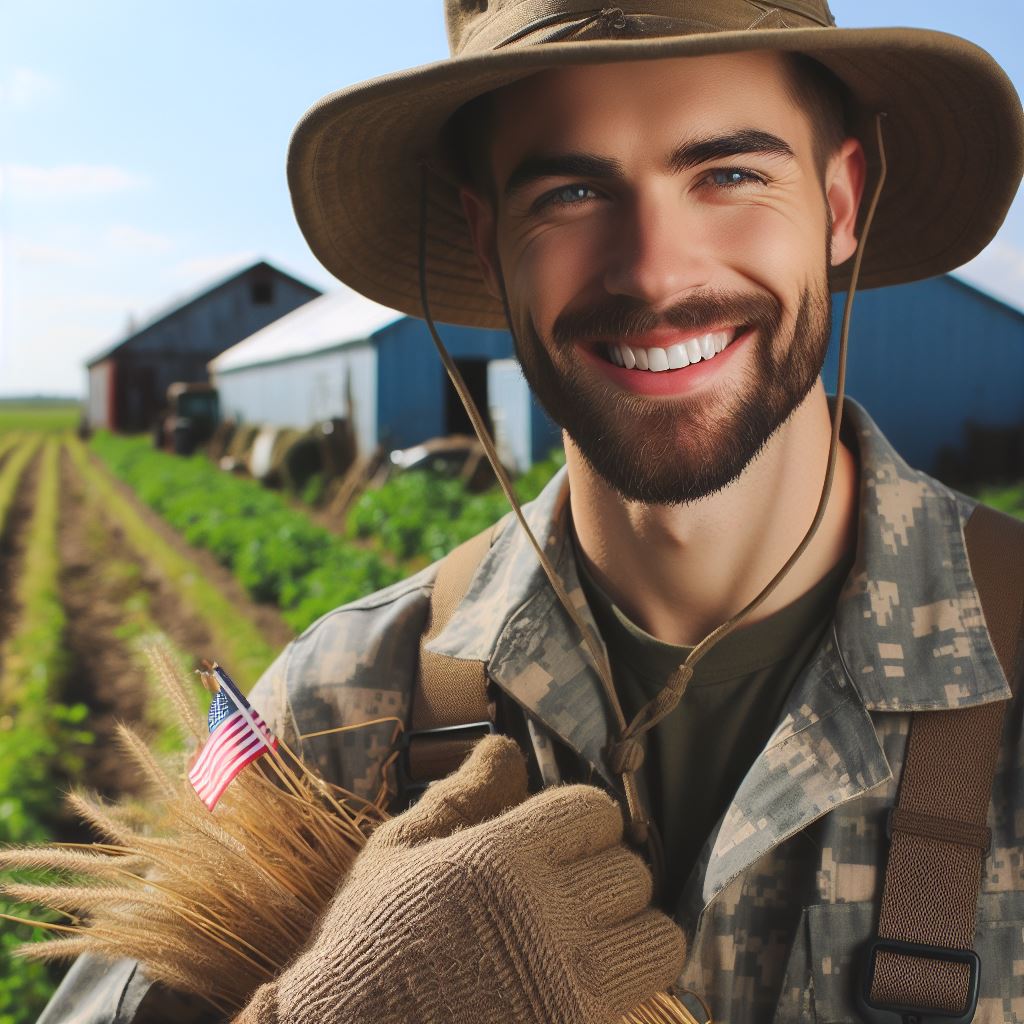Introduction
Veterans transitioning into farming represents a growing trend, reflecting a shift towards sustainable agriculture.
This movement offers purpose, therapy, and contributes to sustainable food production.
As veterans return from service, many seek solace and fulfillment in reconnecting with the land, finding healing and purpose in nurturing crops and livestock.
Moreover, their unique skill sets, discipline, and leadership qualities acquired in the military make them valuable contributors to the agricultural sector.
The significance of this movement extends beyond personal fulfillment; it addresses the pressing need for sustainable food production and strengthens rural communities.
By harnessing their experiences and dedication, veterans are not only cultivating crops but also fostering a sense of camaraderie and resilience within the farming community.
Today, we’ll explore the inspiring stories of veterans who have found new frontiers in farming, embodying the spirit of service and resilience in their pursuit of a sustainable and fulfilling livelihood on the soil.
Background: Why are veterans turning to farming?
Veterans are increasingly embracing farming as a way to transition to civilian life and overcome the challenges they face.
The similarities between military service and farming provide a familiar environment, while the therapeutic aspects of farming offer healing and a sense of purpose.
Challenges Veterans Face in Transitioning to Civilian Life
Transitioning from the military to civilian life can be daunting for veterans. They often struggle with finding meaningful employment or adjusting to a new routine.
Additionally, many veterans experience mental health issues, such as post-traumatic stress disorder (PTSD), which further complicates their transition.
Traditional job markets may not fully understand or appreciate the skills and experiences veterans bring.
The lack of appreciation for their unique qualifications can lead to frustration and feelings of alienation.
As a result, veterans may seek alternative paths, like farming, to regain a sense of purpose and contribute to society.
Similarities Between Military Service and Farming
The farm can become a new battleground for veterans, providing them with a sense of familiarity and structure.
Many veterans find that the discipline and work ethic cultivated during their military service align well with the demands of farming.
Just as military personnel operate in structured hierarchies, farming also requires leadership and a clear chain of command.
The ability to handle high-pressure situations and adapt to unexpected challenges acquired in the military can be valuable in the agricultural field.
Furthermore, like the military, farming necessitates teamwork and camaraderie.
Veterans accustomed to working closely with a tight-knit unit can find solace and connection in the agricultural community, where collaboration and support are often key to success.
The Therapeutic Aspects of Farming for Veterans
Farming serves as a healing force for veterans, helping them overcome trauma and find a renewed sense of purpose.
The therapeutic benefits of farming extend beyond physical labor and can aid in mental and emotional healing.
The act of cultivating land and nurturing crops or animals allows veterans to reconnect with nature, promoting a sense of serenity and calmness.
This connection to the earth, combined with the routine and responsibilities of farming, provides stability and structure that can aid in managing mental health challenges.
Farming also offers veterans a way to give back to their communities and make a positive impact.
Many find satisfaction in providing fresh and sustainable food sources to their local neighborhoods, contributing to food security and the well-being of others.
Moreover, the agricultural lifestyle can foster a sense of accomplishment and mastery.
Seeing the fruits of their labor grow and thrive on the farm gives veterans a tangible reminder of their abilities and resilience.
Veterans turning to farming is a growing phenomenon driven by the challenges faced in transitioning to civilian life, the similarities between military service and farming, and the therapeutic aspects it offers.
As veterans find solace and purpose in working the land, society can benefit from their unique skill sets and contributions to agriculture.
Read: Tractor Tracks: Innovations in Farming
Benefits of veterans in the farming community
Veterans bring an array of unique skills and qualities to the farming community, making them valuable assets in sustaining and advancing the agricultural sector.
The discipline, teamwork, problem-solving abilities, and leadership qualities developed during military service equip veterans with the necessary tools to thrive in farming.
One remarkable trait veteran possess is discipline. Military training instills a strong sense of self-discipline and work ethic, which translates seamlessly into the demands of farming.
They are accustomed to following routines, adhering to protocols, and completing tasks diligently and efficiently.
This level of discipline allows veterans to effectively manage their daily farming activities and ensure productivity.
Transform Your Agribusiness
Unlock your farm's potential with expert advice tailored to your needs. Get actionable steps that drive real results.
Get StartedTeamwork is essential in both military units and farming communities.
Veterans have experience working collaboratively towards a common goal, taking into account the strengths and weaknesses of each team member.
By utilizing their teamwork skills, veterans can effectively operate agricultural machinery, organize farm labor, and partner with other farmers for joint ventures or marketing initiatives.
Problem-solving abilities are paramount for success in farming, as unforeseen challenges often arise. Veterans are trained to think critically and make informed decisions under pressure.
They possess the skills to assess complex situations, find innovative solutions, and adapt to rapidly changing circumstances.
These problem-solving skills come in handy when dealing with issues such as crop diseases, pest control, or equipment breakdowns.
Leadership qualities are deeply ingrained in veterans due to their military experiences.
They understand the importance of clear communication, efficient delegation, and strategic planning.
Veterans can take charge of different aspects of farming operations, overseeing tasks, managing teams, and leading community initiatives.
Their leadership skills contribute to the overall success and growth of the farming community.
Furthermore, veterans’ work ethic is unparalleled.
They have the tenacity to work long hours, endure physically demanding tasks, and persist in the face of setbacks.
This resilience, built through military service, allows them to adapt to the challenging nature of farming.
Veterans understand that success often requires dedication, persistence, and a relentless pursuit of excellence.
Moreover, veterans’ dedication extends to sustainable agricultural practices.
Their experiences of protecting and preserving resources during their military service translate naturally into a commitment to environmental stewardship.
They prioritize ecological sustainability, employ water and soil conservation techniques, and utilize organic farming methods.
Veterans contribute to the agricultural industry’s efforts to embrace sustainability and leave a positive impact on the environment.
In fact, veterans play a crucial role in the farming community, offering a diverse range of skills and qualities.
Their discipline, teamwork, problem-solving abilities, leadership qualities, work ethic, resilience, and dedication to sustainable practices contribute to the overall success and advancement of agriculture.
By recognizing and leveraging these valuable attributes, we can further empower veterans in their transition from soldiers to cultivators of the land.
Read: Barns and Bonds: Community Farming
Resources and initiatives supporting veterans in farming
In recent years, there has been a growing movement to support veterans transitioning into farming.
Various organizations and programs have emerged to help veterans enter the agriculture industry, while government initiatives, grants, and loans are also available to assist them in pursuing their farming dreams.
In this section, we will explore some of these valuable resources and share inspiring stories of successful veteran farmers.
Organizations and programs
Several organizations and programs are dedicated to supporting veterans in their farming endeavors.
The Farmer Veteran Coalition (FVC) is a notable nonprofit organization that assists veterans in acquiring the necessary resources and education to pursue farming.
The FVC offers various programs, such as mentorship opportunities, farmer training workshops, and access to agricultural grants.
Furthermore, the Veterans to Farmers program provides veterans with hands-on training in agricultural practices, equipping them with the skills needed to establish their own farms.
The program also offers job placement assistance to help veterans find employment within the farming community.
Government initiatives, grants, and loans
The federal government has implemented several initiatives to support veterans who aspire to be farmers.
The United States Department of Agriculture (USDA) provides several programs tailored specifically for veterans, such as the Farmer Veteran Fellowship Fund, which awards grants to veterans starting their own agricultural businesses.
Moreover, the USDA offers loan programs specifically designed for veterans, including the Farm Ownership Loans and the Microloan Programs.
These loans provide veterans with financial assistance to purchase land, equipment, and livestock, enabling them to kickstart their farming careers.
Inspiring stories of successful veteran farmers
There are numerous examples of veterans who have successfully transitioned into farming, proving that with determination and support, dreams can be realized.
One such example is Johnathan H. from Iowa, a Marine Corps veteran who turned his passion for sustainable farming into a thriving business.
He now owns a successful organic vegetable farm and is an advocate for other veterans pursuing farming.
Another inspiring story is that of Sarah C., an Army veteran who overcame the challenges of PTSD through farming.
Sarah now runs a therapeutic farm where she cultivates a variety of crops while providing a peaceful environment for veterans to heal and reconnect with nature.
These stories exemplify the incredible potential and resilience of veterans in the farming community.
Their experiences serve as a testament to the impact of the resources and initiatives available to them.
With the support of organizations such as the Farmer Veteran Coalition, government initiatives, grants, and loans, veterans are finding success in the agricultural industry.
These resources and programs provide the necessary tools, education, and financial assistance for veterans to pursue their passion for farming.
Through their stories, we are reminded of the immense potential of veterans in the farming world and the importance of continuing to invest in their future.
Read: Tilling Tales: A Family Farm History

Challenges and obstacles faced by veteran farmers
Difficulties Veterans Encounter when First Starting in Agriculture
Transitioning from military service to agriculture can be overwhelming for veterans.
They face numerous challenges in their new farming career.
- Adjusting to civilian life and a completely different work environment.
- Learning the complexities of agricultural practices and understanding the unique demands of farming.
- Dealing with the physical and mental demands of farming, which can be significantly different from military service.
Lack of Practical Experience and Knowledge in Farming
Many veterans lack prior experience in farming and have limited knowledge about the intricacies of the agricultural industry.
- They may have served in non-agricultural roles during their military careers.
- Without practical experience, veterans must start from scratch and learn the fundamentals of farming.
- Understanding crop selection, soil management, pest control, and other key aspects of farming is essential but can be challenging for veterans.
Addressing Financial Hurdles, Access to Land, and the Need for Ongoing Support and Training
Veteran farmers often face significant financial hurdles, limited access to land, and require ongoing support and training to succeed.
- Lack of initial capital makes it challenging for veterans to invest in equipment, infrastructure, and resources required for farming.
- Acquiring suitable land for farming can be difficult due to high costs and limited availability, especially for new farmers.
- Continuing education, mentorship programs, and support networks are crucial to helping veterans overcome challenges and improve their farming skills.
- Access to markets, marketing strategies, and establishing reliable distribution channels can also pose obstacles for veteran farmers.
In short, veteran farmers face various challenges and obstacles when transitioning into agriculture.
They must overcome difficulties associated with starting anew, lack of practical experience, and knowledge in farming.
Additionally, providing financial assistance, access to land, and ongoing support and training programs are crucial for their success in the farming industry.
By addressing these challenges, we can help our veterans thrive in their new farming frontiers.
Read: Soil and Sweat: The Reality of Farming
Success stories and examples
- Meet Jack, A former army sergeant who found solace in farming after his military service.
- Jack transitioned into organic vegetable farming and now supplies fresh produce to his local community.
- Emily, a retired Marine, started her own livestock farm and provides high-quality meat to nearby restaurants.
- With her farming venture, Emily has not only found financial success but also a sense of purpose.
- Thomas, a Navy veteran, embraced hydroponic farming, growing greens in an urban setting.
- Thomas’ innovative approach has caught the attention of local chefs, making him a recognized name in the culinary sphere.
- Sarah, a former Air Force pilot, now tends to honeybees and produces artisanal honey products.
- Sarah’s dedication to sustainable beekeeping has helped her become a vital player in local ecosystem conservation efforts.
- Many veterans have found fulfillment in sustainable farming practices, giving back to both the soil and the community.
- John, an army veteran, established a cooperative farm where multiple veterans work together in a supportive environment.
- This cooperative farm not only provides veterans with a livelihood but also fosters a sense of camaraderie.
- Veterans-turned-farmers often earn recognition for their brave transition and impactful contributions to local food systems.
- Michael, a former Marine, transformed a barren piece of land into a thriving apple orchard.
- Michael’s orchard not only provides fresh fruits but has become a popular destination for families to enjoy outdoor activities.
- Jessie, an army veteran, specialized in hydroponic lettuce farming, supplying local schools with nutritious greens.
- With her farming venture, Jessie promotes healthy eating habits among children while supporting local agriculture.
- Veterans’ farm businesses thrive not just economically but also socially, strengthening their ties within the community.
- Alex, a retired soldier, became a poultry farmer and shares his knowledge of farming with other veterans through workshops.
- Alex believes in empowering fellow veterans to embark on their journey in agriculture.
- Veterans’ farming models range from traditional practices to modern techniques, showcasing their adaptability and versatility.
These success stories of veterans turned farmers demonstrate their resilience, dedication, and ability to adapt to new challenges.
From organic vegetable farming to hydroponics and livestock farming, veterans have found their niche and are making a positive impact on their communities.
Their achievements not only contribute to local food systems but also provide a sense of fulfillment and personal growth.
Through their hard work, they showcase the potential for veterans to transition into farming and build successful, sustainable businesses.
Conclusion
The growing movement of veterans turning to farming and agriculture is providing numerous benefits for both the veterans themselves and the agricultural industry as a whole.
By transitioning from soldiers to soil, veterans are finding a sense of purpose, healing, and connection to nature.
Additionally, they are contributing to the local economy, promoting sustainable practices, and addressing the issue of food security.
Showcase Your Farming Business
Publish your professional farming services profile on our blog for a one-time fee of $200 and reach a dedicated audience of farmers and agribusiness owners.
Publish Your ProfileFor veterans, farming offers a therapeutic and meaningful way to reintegrate into civilian life.
The hands-on work, sense of responsibility, and community engagement provide a sense of purpose and fulfillment.
Many veterans report that farming helps them cope with PTSD, anxiety, and depression, allowing them to heal from the scars of war.
Moreover, the agricultural industry gains immensely from the involvement of veterans.
These individuals bring with them a strong work ethic, discipline, and leadership skills acquired during their military service.
Their ability to adapt to unpredictable situations, problem-solving skills, and attention to detail make them valuable assets to the sector.
Moreover, veteran farmers contribute to the cultural fabric of rural communities, revitalizing the dwindling farming population.
To support and engage with veteran farmers and programs, readers can take various steps.
First, they can seek out and buy products from veteran-owned farms, providing economic support and recognition.
Supporting organizations and programs that assist veterans in transitioning to farming is also crucial.
Readers can volunteer, donate, or become advocates for policies that promote veterans’ involvement in agriculture.
In review, the movement of veterans turning to farming is fostering healing, empowerment, and economic growth.
By supporting and engaging with veteran farmers and programs, we can honor their service while contributing to a more sustainable and resilient agricultural industry.
Let us embrace the soldiers-turned-farmers and reap the benefits of this fruitful collaboration.




